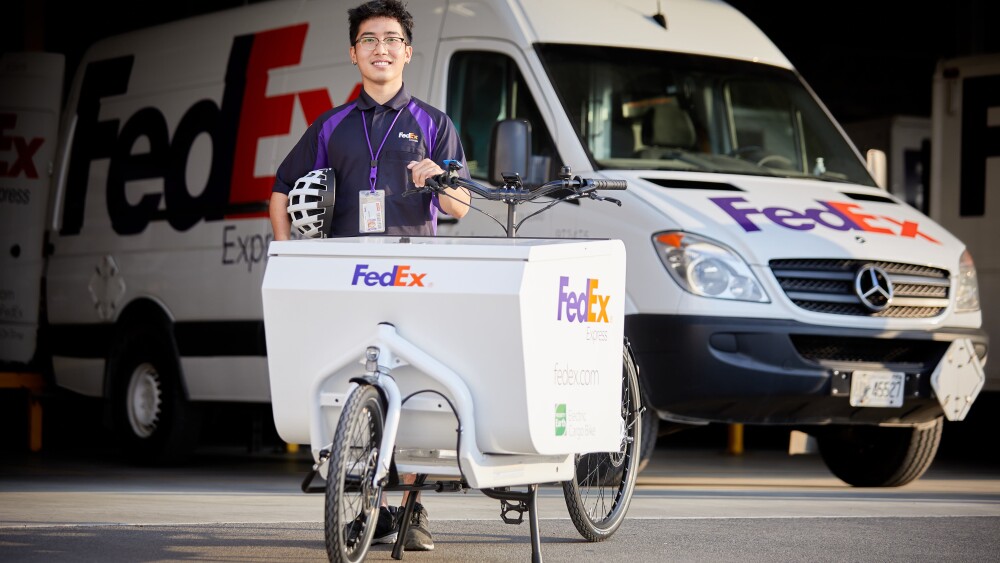Hong Kong SAR, China, November 18, 2022 – The latest report What’s Next in Hong Kong’s E-Commerce from FedEx Express, one of the world’s largest express transportation companies reveals that Hong Kong consumers now place sustainability in their purchase decision-making, while Hong Kong SMEs are relatively less focused on sustainability when running their businesses.
Hong Kong consumers are more lead-time focused, but are also concerned about sustainability
The growth of e-commerce during the COVID pandemic accelerated as consumer concerns over the environment continue to grow. For a significant number of consumers, the future of the planet is very much on top of their minds. However, commercial growth is not always friendly to the environment, and last-mile delivery demands are in conflict with sustainability. Among the 11 AMEA markets, in a scale that focuses on lead time and sustainability, Hong Kong consumers are ranked second in lead time, thus placed second-last in sustainability, just ahead of Taiwan. Conversely, consumers in Vietnam, Thailand and South Korea place greater priority on sustainability over delivery speed.
In Hong Kong, long delivery lead-times stood out as the consumers’ biggest pain point (46%) with 67% of online orders typically taking over 3 days to arrive. While the majority (71%) of Hong Kong consumers believe delivery remains the top priority in their shopping experience as they have been in sustainable shopping, 62% of consumers are more likely to buy goods from companies with an ESG policy. However, two-thirds (66%) of SMEs believe that customers are more interested in the cost of delivery than participating in sustainable e-commerce, resulting in sustainability being put on the back burner altogether. Only 22% of SMEs have had an ESG policy. There is an opportunity for logistics providers to take the lead in working with SMEs to deliver in a more sustainable and efficient way with the lowest cost.
“Sustainability is no longer an optional extra for SMEs interested in expanding their e-commerce businesses. Consumers increasingly see it as an essential and non-negotiable part of their decision-making process,” said Kawal Preet, president of Asia Pacific, Middle East & Africa (AMEA) at FedEx Express. “SMEs can make an immediate difference by thinking about the logistics connecting their supply chain all the way to the end-consumer. At FedEx, we’re already taking tangible steps to mitigate the impact of delivery on the planet.”
FedEx is following a multi-track path to reduce carbon emissions in the delivery cycle with a goal of achieving carbon neutral global operations by 2040. This includes investing in electric vehicles for last-mile deliveries, and digital solutions like FedEx Ship Manager® Lite that allows consumers to fill out their shipping information using their mobile device to quickly generate a label supporting our ultimate goal of zero paper air waybills. Additionally, FedEx is implementing solutions like reusable packaging to help reduce waste in the shipping process.
“Over the past year, we have been mapping our path forward, including launching Priority Earth, our ambitious, comprehensive initiative that is our commitment to deliver a more sustainable future.” said Anthony Leung, managing director, FedEx Express Hong Kong and Macau. “As one of the leading logistics providers in the world, FedEx plays an important role to ensure our services bring the lowest possible impact possible onto the planet, while aligning with consumer expectations. We have been working hard to advance our sustainability mission, which has included enterprise-wide initiatives, as well as collaborations with NGOs and other companies leading the charge on sustainability. This world we live in is the address we all share. That is why this eco-friendly initiative is our most important delivery yet.”
###
About the What’s Next in E-Commerce Survey
The online survey was conducted by Harris Interactive in July 2022 across 11 markets including Australia, Hong Kong, India, Japan, Malaysia, Philippines, Singapore, South Korea, Taiwan, Thailand and Vietnam. 300 small and medium businesses with less than 250 employees engaged in e-commerce were polled in each market alongside 500 consumers (1,000 in India) over the age of 18. To access the full report, click here.
